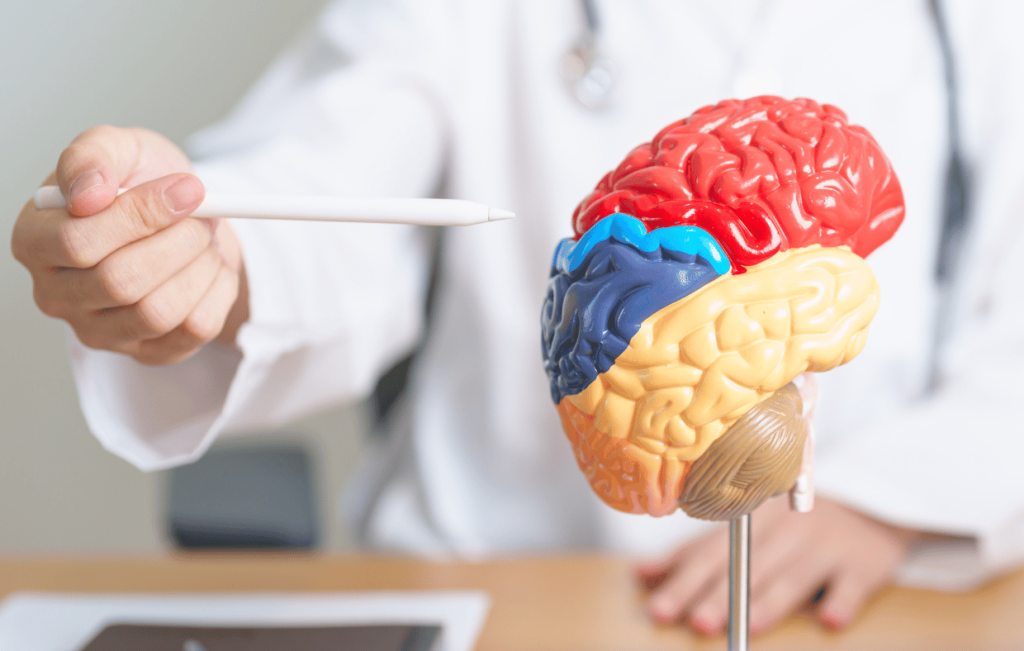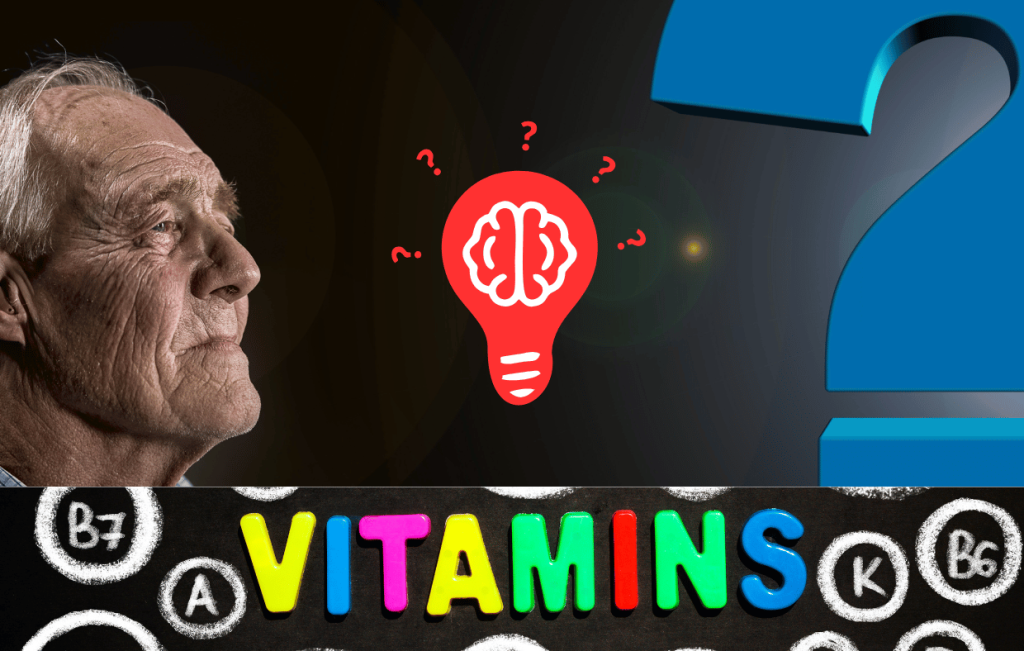Dementia, including Alzheimer’s disease, is a growing concern among older adults worldwide. With the increasing prevalence of cognitive decline, researchers and healthcare providers are exploring the potential benefits of dietary supplements and the best vitamins to support brain function and cognitive health.
Vitamins such as vitamin E, vitamin D, and B vitamins, alongside fatty acids and other supplements, have been studied for their roles in improving cognitive skills and reducing dementia risk.
If you’re looking for proven strategies to stimulate cognitive health and brain function, you can start with this brain health resource: Neurozoom Brain Health Quiz.
This guide will discuss the best vitamins for dementia, highlight findings from clinical trials, and offer insights into how a healthy lifestyle, including a Mediterranean diet, can support brain health.
Understanding Dementia and Alzheimer’s Disease

Dementia encompasses various forms of cognitive decline, including Alzheimer’s disease, vascular dementia, and Lewy body dementia. These conditions impair memory, cognitive function, and daily routines, significantly impacting the quality of life for older people.
While genetic and environmental risk factors contribute to the progression of dementia, emerging evidence suggests that dietary and lifestyle interventions, such as incorporating certain vitamins and supplements, may play an important role in promoting cognitive health.
Key Vitamins and Supplements for Cognitive Function

1. Vitamin E
Vitamin E is a powerful antioxidant that helps neutralize free radicals, protecting nerve cells from oxidative stress. Research studies, including a randomized clinical trial, have shown that vitamin E may support cognitive aging and significantly improve global cognition among dementia patients.
Foods such as olive oil, nuts, and seeds are good sources of this essential vitamin, but vitamin E supplementation can also benefit older adults with mild cognitive impairment.
2. Vitamin D
Low vitamin D levels are common among older people and are associated with an increased risk of cognitive decline. Vitamin D deficiency has been linked to poor bone health and potential cognitive health issues.
Adequate levels of vitamin D, achieved through vitamin D supplements or exposure to sunlight, are critical for maintaining brain health. Recent studies indicate that vitamin D supplementation may reduce dementia risk and support normal cognition in older adults.
3. B Vitamins
The B vitamins, particularly folic acid, vitamin B6, and vitamin B12, are vital for brain function. B vitamin supplements help reduce homocysteine levels, an amino acid associated with an increased risk of cognitive decline and cardiovascular disease.
Clinical trials suggest that these vitamins can slow the progression of dementia and improve memory loss in individuals with mild cognitive impairment. Good sources of B vitamins include breakfast cereals, leafy greens, and fish.
4. Vitamin C
Vitamin C’s antioxidant properties make it a crucial nutrient for combating oxidative stress and protecting brain cells. Citrus fruits, bell peppers, and broccoli are rich in vitamin C, which may help lower the risk of dementia.
Previous studies have shown that vitamin C supplementation can provide cognitive benefits and support healthy aging.
5. Fatty Acids
Fatty acids, such as omega-3s found in fatty fish and fish oil supplements, are essential for maintaining cognitive health. These nutrients support the structure and function of nerve cells and have been linked to a lower risk of dementia.
The Mediterranean diet, which includes fatty fish and olive oil, offers a good source of these beneficial fatty acids.
6. Ginkgo Biloba
Ginkgo biloba, a herbal supplement, has been studied for its potential benefits in improving cognitive function and memory. While there is enough evidence to suggest that it may be helpful for some dementia patients, more research is needed to establish strong evidence for its effectiveness.
Lifestyle Factors Supporting Cognitive Health

Mediterranean-Style Diet
A Mediterranean-style diet rich in fruits, vegetables, whole grains, olive oil, and fatty fish is associated with a lower risk of cognitive decline. This diet provides essential vitamins, antioxidants, and fatty acids that support brain health and may slow the progression of dementia.
Physical Activity
Regular physical activity is another important factor in maintaining cognitive function. Exercise improves cardiovascular health, reduces the risk of vascular dementia, and supports overall cognitive aging.
Healthy Lifestyle Choices
Maintaining a healthy diet, staying physically active, and avoiding smoking and excessive alcohol consumption are key components of a lifestyle that promotes cognitive health. These choices help mitigate risk factors associated with cognitive decline and support normal cognition.
Clinical Trials and Research Insights

Multivitamin Outcomes Study
The Multivitamin Outcomes Study conducted at institutions like Columbia University and Rush University Medical Center has provided good news for those exploring the potential benefits of multivitamin supplementation. Findings suggest that multivitamins may offer a significant improvement in cognitive skills among older adults.
Cocoa Flavanols
Recent studies have highlighted the cognitive benefits of cocoa flavanols, a compound found in cocoa. These compounds may improve brain function and reduce the risk of cognitive decline, as demonstrated in a new study published in the American Journal of Clinical Nutrition.
Separate Cognition Studies
Separate cognition studies and reviews, such as the New Cochrane Review, have provided additional information on the impact of dietary and mineral supplements on cognitive health. These studies emphasize the importance of addressing micronutrient deficiencies to support brain health.
Addressing Adverse Effects and Medical Advice

While dietary supplements and vitamins offer potential benefits for dementia patients, it is essential to consider adverse effects and consult a healthcare provider before starting any supplementation regimen.
Healthcare professionals can provide medical advice tailored to individual health conditions and ensure the safe use of supplements.
Incorporating Vitamins into Your Daily Routine
To reap the cognitive benefits of vitamins and supplements, consider the following tips:
- Eat a Balanced Diet: Incorporate a variety of nutrient-rich foods such as fatty fish, citrus fruits, leafy greens, and whole grains into your meals.
- Consider Supplementation: For individuals with low vitamin D levels or specific deficiencies, supplements such as vitamin D supplementation, fish oil, or B vitamin supplements may be beneficial.
- Stay Informed: Keep up with research studies and clinical trials to understand the latest findings on vitamins and cognitive health.
- Consult a Healthcare Provider: Always seek medical advice before adding new supplements to your daily routine to ensure they align with your health needs.
Conclusion
Dementia and Alzheimer’s disease pose significant challenges for older adults and their caregivers. However, incorporating essential vitamins and dietary supplements into a healthy lifestyle offers a promising way to support cognitive function and brain health.
From vitamin E and vitamin D to B vitamins and fatty acids, these nutrients play an important role in reducing dementia risk and improving quality of life.
By combining a Mediterranean-style diet, regular physical activity, and guidance from healthcare providers, older people can take proactive steps to promote cognitive aging and maintain brain function.
Q&A: Common Questions About Dementia and Diet
What is the daily drink for dementia?
A daily drink rich in antioxidants, such as green tea, or a nutrient-packed smoothie with leafy greens, citrus fruits, and berries, can help support brain health. These beverages provide essential vitamins and compounds that combat oxidative stress and promote cognitive function.
What is the number one food that fights dementia?
Fatty fish, such as salmon or mackerel, is considered one of the best foods to fight dementia. It is rich in omega-3 fatty acids, which support brain health and reduce the risk of cognitive decline.
How to calm dementia patients at night?
To calm dementia patients at night, establish a consistent bedtime routine, reduce stimulants like caffeine, and create a calming environment. Soft lighting, soothing music, or aromatherapy with lavender can also help ease nighttime agitation.
What should dementia patients not eat?
Dementia patients should avoid foods high in trans fats, refined sugars, and excessive sodium, such as processed snacks and fast food. These can contribute to inflammation and negatively impact brain health.


